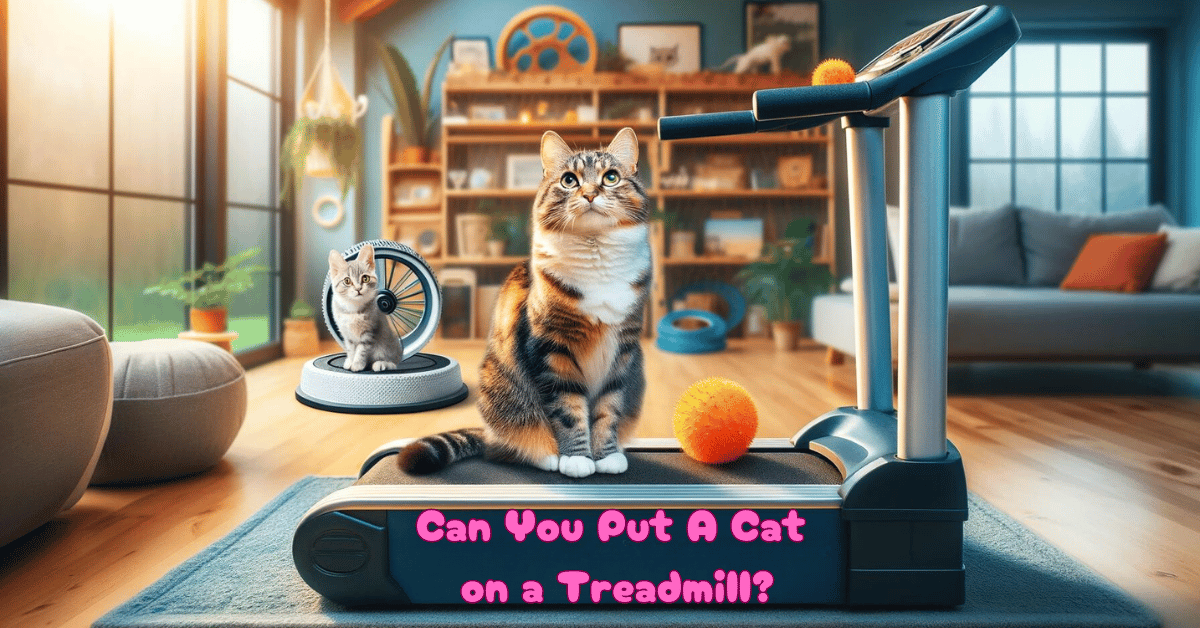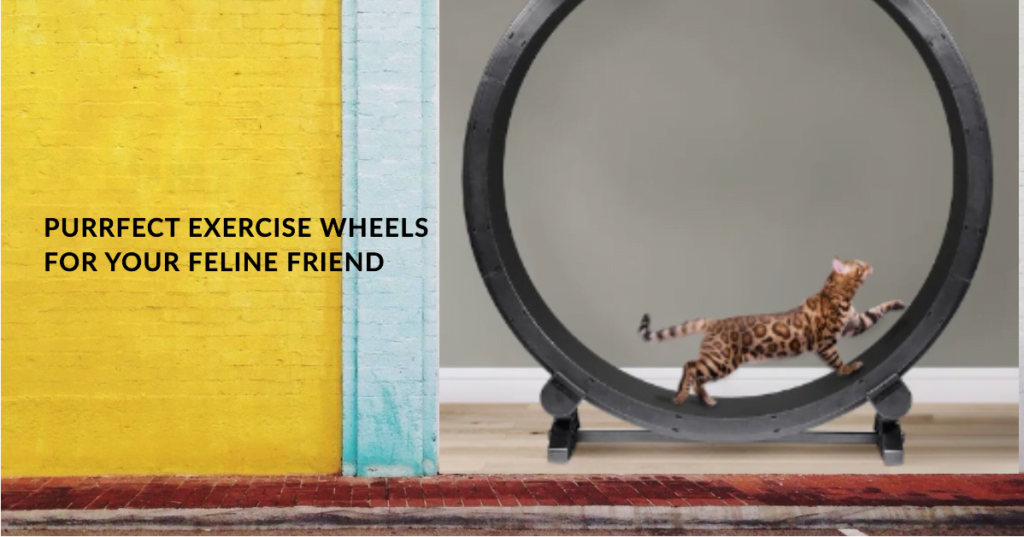This post contains affiliate links and I will be compensated if you make a purchase after clicking on my links.
Kicking Off with Curiosity: Can You Put a Cat on a Treadmill?
In the realm of pet care, especially for our feline friends, the question of maintaining optimal fitness is always a topic of keen interest. Among the myriad of exercise options, the idea of putting a cat on a treadmill sparks both curiosity and debate.
The short answer to your question is: Yes, it’s possible, but there are better options.
It’s a concept that merges the world of technology with animal wellness, pushing the boundaries of traditional pet exercise routines. This article delves into the treadmill as a potential exercise tool for cats, weighing its feasibility against a more tailored, safer alternative that promises to keep those kitty paws moving without the pitfalls.
The Curiosity Behind Cats and Treadmills
Why would a cat owner consider a treadmill for their pet?
The answer often lies in the whimsical energy bursts that cats are known for. These sporadic spurts of activity are not just adorable but are crucial for their health and well-being. A treadmill might seem like a straightforward solution to channel this energy, especially for indoor cats with limited space to roam and explore.

Moreover, introducing cats to such exercise routines at a young age could potentially aid in better acclimatization, fostering a habit that could contribute to their overall health and fitness as they age.
Evaluating the Treadmill Option For Your Cat

The feasibility of cats using treadmills involves a careful consideration of benefits and challenges.
Pros of Treadmill For Cats
- ✔ Controlled Exercise Environment
- ✔ Physical Activity Assurance
- ✔ Weight Management and Health
On one hand, treadmills could offer a controlled environment for exercise, ensuring that cats get their needed physical activity regardless of weather conditions or space constraints.
This controlled exercise could be particularly beneficial for weight management and maintaining cardiovascular health, which are common concerns for indoor cats.
Cons of Treadmill For Cat
- ✖ Safety Concerns
- ✖ Stress and Injury Risk
- ✖ Lack of Autonomy
- ✖ Practical Challenges
However, the challenges and limitations are significant. The foremost concern is safety; treadmills designed for humans are not inherently safe for cats without constant supervision. The risk of stress or injury is not trivial—cats could become frightened or hurt if they lose their footing or cannot keep pace with the machine.
Moreover, the very nature of a treadmill’s operation requires human intervention to start and monitor the exercise session, stripping away the cat’s autonomy and potentially leading to a stressful experience rather than an enjoyable one. And let’s not forget, being forced to do anything is pretty high on their list of no-thanks.
This exploration reveals a complex picture: While treadmills could theoretically serve as an exercise tool for cats, the practicalities involved raise questions about their suitability and safety. The need for a safer, more autonomous option leads us to consider an alternative that might better serve our feline companions’ exercise needs.
Training Your Cat Using a Treadmill
After carefully considering the pros and cons, if you’ve decided to introduce your cat to a treadmill, rest assured, it’s a goal within reach.
Our kitties, especially the younger ones, possess a surprising capacity for learning and adapting – often, they’re much smarter and more adaptable than we give them credit for.
Here’s how you can guide your feline friend towards becoming a treadmill enthusiast:

1. Familiarization
First Encounters: Start by introducing your cat to the treadmill while it is turned off. Gently place your cat on the stationary treadmill, providing cuddles and comfort to help her feel secure. This initial step is all about getting her comfortable with the treadmill’s presence
2. Creating a Positive Association
Treats and Praise: Use your cat’s favorite treats to create positive associations with the treadmill. Place treats on the machine to encourage closer inspection and interaction.
3. Gradual Introduction
Start Slow: Once your cat seems comfortable being near the treadmill, turn it on to the lowest setting without encouraging them to get on. Let them adjust to the sight and sound.
4. First Steps
Guided Exploration: With the treadmill on its slowest setting, gently place your cat on the treadmill. Use a leash for guidance if they’re comfortable with it, and always keep treats handy to motivate and reward.
5. Building Confidence
Consistent Training: Short, regular sessions are key. Gradually increase the time your cat spends walking on the treadmill, always prioritizing their comfort and willingness to participate.
6. Monitoring and Adjusting
Stay Attentive: Pay close attention to your cat’s body language and behavior. If they show any signs of stress or discomfort, reduce the speed or give them a break. The goal is to ensure the treadmill becomes a source of fun, not fear.
7. Celebrating Milestones
Rewards and Recognition: Celebrate every little victory with your cat. Whether it’s a longer time spent on the treadmill or a session where they hop on willingly, acknowledgment and treats will reinforce positive behavior.
Safety First
Remember, patience is your best friend in this process. Never force your cat to stay on the treadmill if they’re unwilling, and always supervise their treadmill time to ensure their safety. It might take a while, but with consistency and lots of love, your feline friend might just surprise you with their treadmill prowess.
The Cat Wheel: A Superior Alternative
As we pivot from the treadmill’s potential to a solution that promises not just efficacy but also safety and enjoyment, the cat wheel emerges as a standout contender.
This ingenious device offers a safer, more engaging, and inherently cat-friendly exercise solution, aligning seamlessly with a cat’s natural behaviors and need for autonomy. The open design invites their curiosity and allows them to engage at their own pace, reducing stress and making the experience enjoyable.
Unlike the treadmill, which necessitates human oversight, the cat wheel empowers our feline companions to initiate their play and workout sessions on their own terms (still supervised at first), mimicking their natural environment where they can run and explore freely.
| Feature | Treadmill | Cat Wheel |
|---|---|---|
| Supervision Needed | High, especially at first | Moderate initially, then minimal |
| Ease of Training | More challenging | Generally easier |
| Cat Autonomy | Limited; paced by machine | High; self-paced exercise |
| Stimulation | Mainly physical | Both physical and mental |
| Space | Typically bulky | Varies; can be large |
| Engagement | Less natural for cats | More natural and enjoyable |
| Durability | Variable; not cat-specific | Depends on model; cat-specific designs available |
| Multi-Cat Use | More structured scheduling needed | Easier sharing among cats |
| Health Monitoring | Rare | Available in some models |
| Noise | Variable; generally louder | Depends on model; can be quiet |
Technical Aspects and Features of Cat Wheels
When considering a cat wheel, tech-savvy pet owners will appreciate delving into the technical aspects that make one model stand out from another.
Durability, stability, and size are paramount; a well-constructed wheel can withstand the vigor of the most enthusiastic felines, ensuring longevity and safety. The size of the wheel is also crucial—it must be large enough to accommodate your cat’s stride while being compact enough to fit in your living space comfortably.
Some models come equipped with smart technology, tracking exercise duration and frequency, which can be particularly appealing for owners interested in monitoring their cat’s fitness levels.
The Last Word: Can You Put a Cat on a Treadmill?
Exploring the realms of treadmills and cat wheels has unveiled a clear preference for the latter, considering the safety, ease of use, and alignment with feline instincts that cat wheels offer.
By choosing exercise equipment that prioritizes their safety and natural behaviors, we contribute positively to their physical and mental health. The cat wheel, with its blend of technology, safety, and fun, stands as an innovative pet care, encouraging an active lifestyle that cats can enjoy on their terms.


